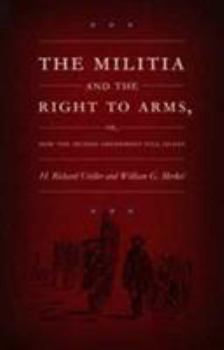The Militia and the Right to Arms: Or, How the Second Amendment Fell Silent
(Part of the Constitutional Conflicts Series)
Select Format
Select Condition 
Book Overview
"A well regulated Militia, being necessary to the security of a free State, the right of the people to keep and bear Arms, shall not be infringed." --Amendment II, United States Constitution The Second Amendment is regularly invoked by opponents of gun control, but H. Richard Uviller and William G. Merkel argue the amendment has nothing to contribute to debates over private access to firearms. In The Militia and the Right to Arms, or, How the Second Amendment Fell Silent , Uviller and Merkel show how postratification history has sapped the Second Amendment of its meaning. Starting with a detailed examination of the political principles of the founders, the authors build the case that the amendment's second clause (declaring the right to bear arms) depends entirely on the premise set out in the amendment's first clause (stating that a well-regulated militia is necessary to the security of a free state). The authors demonstrate that the militia envisioned by the framers of the Bill of Rights in 1789 has long since disappeared from the American scene, leaving no lineal descendants. The constitutional right to bear arms, Uviller and Merkel conclude, has evaporated along with the universal militia of the eighteenth century. Using records from the founding era, Uviller and Merkel explain that the Second Amendment was motivated by a deep fear of standing armies. To guard against the debilitating effects of militarism, and against the ultimate danger of a would-be Caesar at the head of a great professional army, the founders sought to guarantee the existence of well-trained, self-armed, locally commanded citizen militia, in which service was compulsory. By its very existence, this militia would obviate the need for a large and dangerous regular army. But as Uviller and Merkel describe the gradual rise of the United States Army and the National Guard over the last two hundred years, they highlight the nation's abandonment of the militia ideal so dear to the framers. The authors discuss issues of constitutional interpretation in light of radically changed social circumstances and contrast their position with the arguments of a diverse group of constitutional scholars including Sanford Levinson, Carl Bogus, William Van Alstyne, and Akhil Reed Amar. Espousing a centrist position in the polarized arena of Second Amendment interpretation, this book will appeal to those wanting to know more about the amendment's relevance to the issue of gun control, as well as to those interested in the constitutional and political context of America's military history.
Format:Paperback
Language:English
ISBN:0822330172
ISBN13:9780822330172
Release Date:January 2003
Publisher:Duke University Press
Length:338 Pages
Weight:1.30 lbs.
Dimensions:0.9" x 6.1" x 9.3"
Customer Reviews
2 ratings
Armed with the truth for a change
Published by Thriftbooks.com User , 21 years ago
This book seeks to balance two predominant schools of thought regarding the Second Amendment: The individualist school and the collective rights school. Uviller and Merkel's thesis is that the right to bear arms was an individual right, but only within a collective context of service in a state sanctioned, regulated and disciplined militia. The book has it right. Uviller and Merkel are well researched. This book is not a polemical such as Halbrook's "That Every Man Be Armed" - it is historical scholarship. A must read for anyone who seeks a scholarly and objective, as well as balanced approach to the understanding of the Second Amendment.
Very enlightening
Published by Thriftbooks.com User , 21 years ago
This is a must read for anyone who really wants to understand the truth about the second amendment.The authors present an impressive amount of historical research to show that the second amendment protects an individual right to bear arms only in connection with an organized citizen militia. Some have claimed that the second amendment protects an unconditional right to bear arms. However, an objective examination of history, reveals that this notion is undoubtedly false. The term "bear arms" referred to military service at the time of the writing of the second amendment. When deciding on the language of the second amendment, the first congress debated whether conscientous objectors should be exempt from bearing arms. Obviously, they weren't talking hunting or using guns to defend one's home against criminals.






